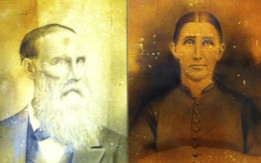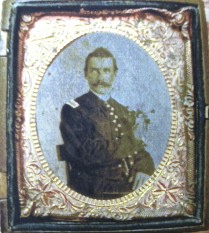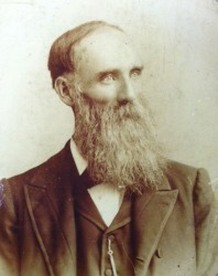Caleb H. Casdorph
Lieutenant, 8th West Virginia Mounted Infantry
(later 7th W.V. Cavalry).
 Caleb and Elizabeth
Caleb and Elizabeth
Caleb Casdorph rode on the Salem Raid in December 1863, and was one of about 120 of the 2,500 who did not triumphantly return to Beverly on Christmas Day. Captured at Covington, Virginia, Caleb was one of a handful who survived incarceration.
The son of John and Delilah Casdorph, Caleb was born January 19, 1836. The oldest of thirteen children, he was raised on the homeplace at Guthrie, West Virginia (now the Sissonville Road). His father was a farmer. Since the only two surviving brothers were the youngest of the large family, Caleb was undoubtedly his father's fellow farmer and mainstay.
At age twenty-five Caleb was enlisted as a private into Company A of the 8th West Virginia Mounted Infantry (re-designated as the 7th West Virginia Cavalry in early 1864). His Company muster-in roll, dated November 6, 1861, lists his rank as 2nd Lieutenant; he most likely attained this rank by a popular vote from the rest of the soldiers in Company A. After nearly two-and-a-half years of service, he was taken prisone-of-war by the Confederate Army on December 19th, 1863 near Covington, Virginia while returning from General Averell's famed Salem Raid. He was taken to Richmond, Virginia to a facility for officers, the infamous Libby Prison. Food was scarce during the war, especially for P.O.W.s. Caleb, his first cousin William Harrison Casdorph, along with the other prisoners, were starving.
Harrision Casdorph died in prison. Caleb attributed his cousin's death to starvation, though the military record states Harrison's cause of death as malaria. Caleb survived the rigors o that prison, but suffered ill health the rest of his life, as indicated in his application for pension many years later. It stated that he could not perform heavy labor on the farm, and was able to do chores only; he was forced to hire men to do the heavy work.
Caleb was released and mustered out of the service with an honorable discharge on March 5, 1865. When he arrived home, he rode a big black horse to nearby Edens Fork where Elizabeth Edens lived. He jumped off his horse, grabbed her and kissed her in front of everyone. They were married on December 28, 1865. Four years later Elizabeth's parents, John and Eliza Edens, sold the house and part of the acreage to Caleb and Elizabeth and the Edens moved by covered wagon to Missouri.
Caleb and Elizabeth ran a progressive farm, and were considered well-to-do. They became the parents of eleven children. Caleb was a Hardshell Baptist, and preached at the church on Sissonville Road. They lived together a little more than twenty-eight years, when Elizabeth was struck down suddenly with cerebral hemorrhage and died instantly.
Caleb married the second time about two years after Betsy's death to Martha Morris. Theirs was a congenial marriage, but ended with her death several years later. He married a third time to Mrs. Malinda Collins, but this was an unhappy union. However, he provided for her very well in his will, proving him to be a fair and generous man.
Caleb Casdorph lived a long life, in spite of his health problems from his war experiences. He continued to farm and sell the produce to customers in Charleston. He was five foot-eleven inches tall, had light hair, fair complexion and blue eyes. Priding himself on his military bearing, he stood quite straight and slender. He was a familiar sight, riding his mare "Nancy" throughout the community.
At age eighty-two, Caleb was still selling produce from his farm by driving his horse and buggy to town. He delivered milk, butter and other farm products to his regular customers in Charleston, about eight miles away. On Tuesday, November 19th, 1918, he was struck by a moving train. His beloved mare, Nancy, was was killed. The buggy was demolished. The base of Caleb's skull was fractured, and he died about two hours later. The Charleston Gazette headed the newspaper article with "Civil War hero killed at West Side death trap." The funeral service was held at the Trinity Baptist Church on Kanawha Two Mile at three in the afternoon, and he is buried in the Guthrie Cemetery.
For more information contact Jimmy Casdorph.
The son of John and Delilah Casdorph, Caleb was born January 19, 1836. The oldest of thirteen children, he was raised on the homeplace at Guthrie, West Virginia (now the Sissonville Road). His father was a farmer. Since the only two surviving brothers were the youngest of the large family, Caleb was undoubtedly his father's fellow farmer and mainstay.
At age twenty-five Caleb was enlisted as a private into Company A of the 8th West Virginia Mounted Infantry (re-designated as the 7th West Virginia Cavalry in early 1864). His Company muster-in roll, dated November 6, 1861, lists his rank as 2nd Lieutenant; he most likely attained this rank by a popular vote from the rest of the soldiers in Company A. After nearly two-and-a-half years of service, he was taken prisone-of-war by the Confederate Army on December 19th, 1863 near Covington, Virginia while returning from General Averell's famed Salem Raid. He was taken to Richmond, Virginia to a facility for officers, the infamous Libby Prison. Food was scarce during the war, especially for P.O.W.s. Caleb, his first cousin William Harrison Casdorph, along with the other prisoners, were starving.
Harrision Casdorph died in prison. Caleb attributed his cousin's death to starvation, though the military record states Harrison's cause of death as malaria. Caleb survived the rigors o that prison, but suffered ill health the rest of his life, as indicated in his application for pension many years later. It stated that he could not perform heavy labor on the farm, and was able to do chores only; he was forced to hire men to do the heavy work.
Caleb was released and mustered out of the service with an honorable discharge on March 5, 1865. When he arrived home, he rode a big black horse to nearby Edens Fork where Elizabeth Edens lived. He jumped off his horse, grabbed her and kissed her in front of everyone. They were married on December 28, 1865. Four years later Elizabeth's parents, John and Eliza Edens, sold the house and part of the acreage to Caleb and Elizabeth and the Edens moved by covered wagon to Missouri.
Caleb and Elizabeth ran a progressive farm, and were considered well-to-do. They became the parents of eleven children. Caleb was a Hardshell Baptist, and preached at the church on Sissonville Road. They lived together a little more than twenty-eight years, when Elizabeth was struck down suddenly with cerebral hemorrhage and died instantly.
Caleb married the second time about two years after Betsy's death to Martha Morris. Theirs was a congenial marriage, but ended with her death several years later. He married a third time to Mrs. Malinda Collins, but this was an unhappy union. However, he provided for her very well in his will, proving him to be a fair and generous man.
Caleb Casdorph lived a long life, in spite of his health problems from his war experiences. He continued to farm and sell the produce to customers in Charleston. He was five foot-eleven inches tall, had light hair, fair complexion and blue eyes. Priding himself on his military bearing, he stood quite straight and slender. He was a familiar sight, riding his mare "Nancy" throughout the community.
At age eighty-two, Caleb was still selling produce from his farm by driving his horse and buggy to town. He delivered milk, butter and other farm products to his regular customers in Charleston, about eight miles away. On Tuesday, November 19th, 1918, he was struck by a moving train. His beloved mare, Nancy, was was killed. The buggy was demolished. The base of Caleb's skull was fractured, and he died about two hours later. The Charleston Gazette headed the newspaper article with "Civil War hero killed at West Side death trap." The funeral service was held at the Trinity Baptist Church on Kanawha Two Mile at three in the afternoon, and he is buried in the Guthrie Cemetery.
For more information contact Jimmy Casdorph.

